Stakeholder Analysis in Event Management: A Case Study of MotoGP 2018
VerifiedAdded on 2021/01/01
|7
|1911
|72
Essay
AI Summary
This essay delves into the critical role of stakeholder analysis within event management, emphasizing its significance for event success. The study uses the Australian Motorcycle Grand Prix 2018 as a case study to illustrate the practical application of stakeholder analysis. The essay defines event management and stakeholders, highlighting their interconnectedness and influence on event outcomes. It explores the relationships between event organizers and various stakeholders, including volunteers, spectators, sponsors, and government entities, underscoring the need to understand and address their diverse needs and expectations. The essay also examines the risks associated with neglecting stakeholder analysis, such as potential conflicts, reputational damage, and resource constraints. It concludes by emphasizing the necessity of a balanced approach to stakeholder management to achieve long-term success in event planning and execution, ensuring support and minimizing potential issues.
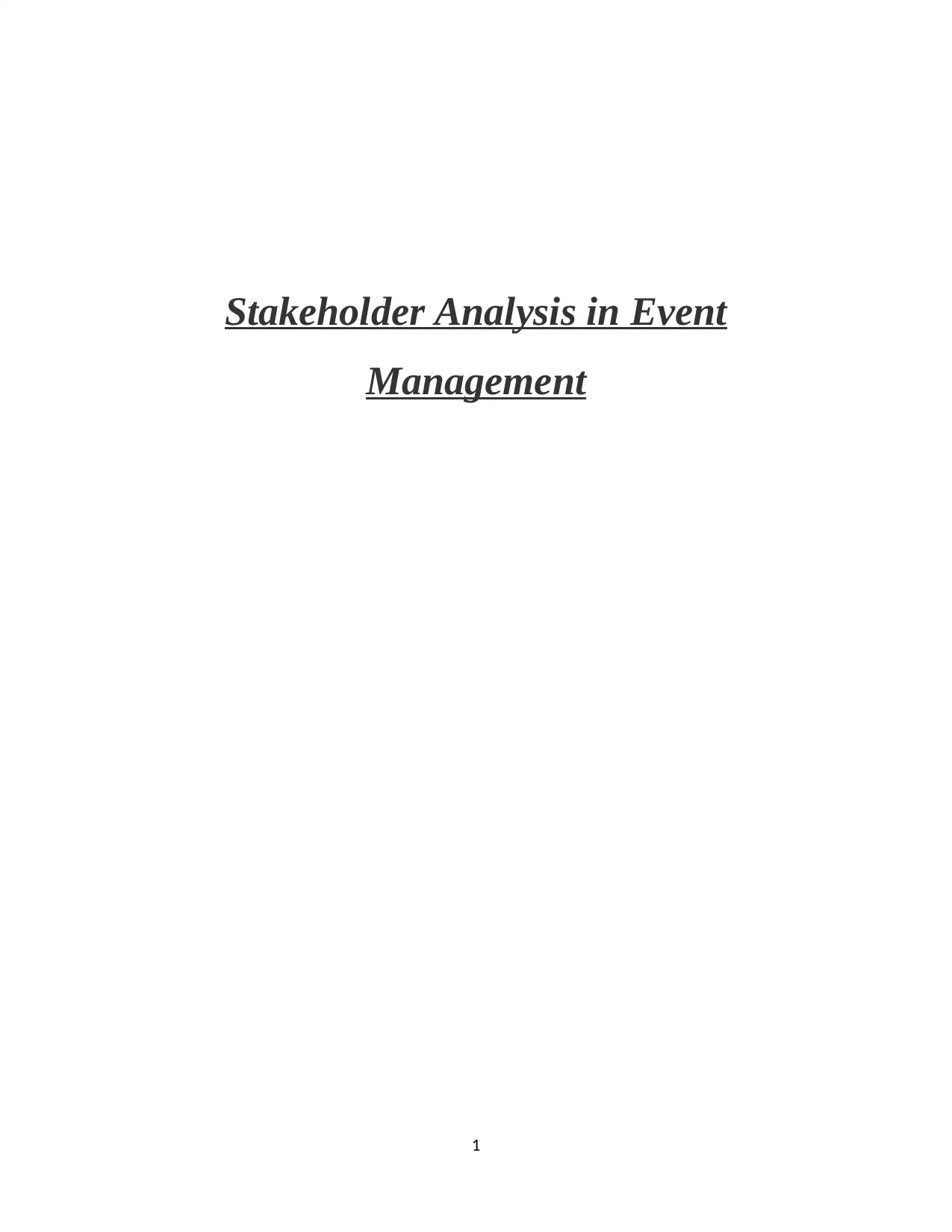
Stakeholder Analysis in Event
Management
1
Management
1
Paraphrase This Document
Need a fresh take? Get an instant paraphrase of this document with our AI Paraphraser
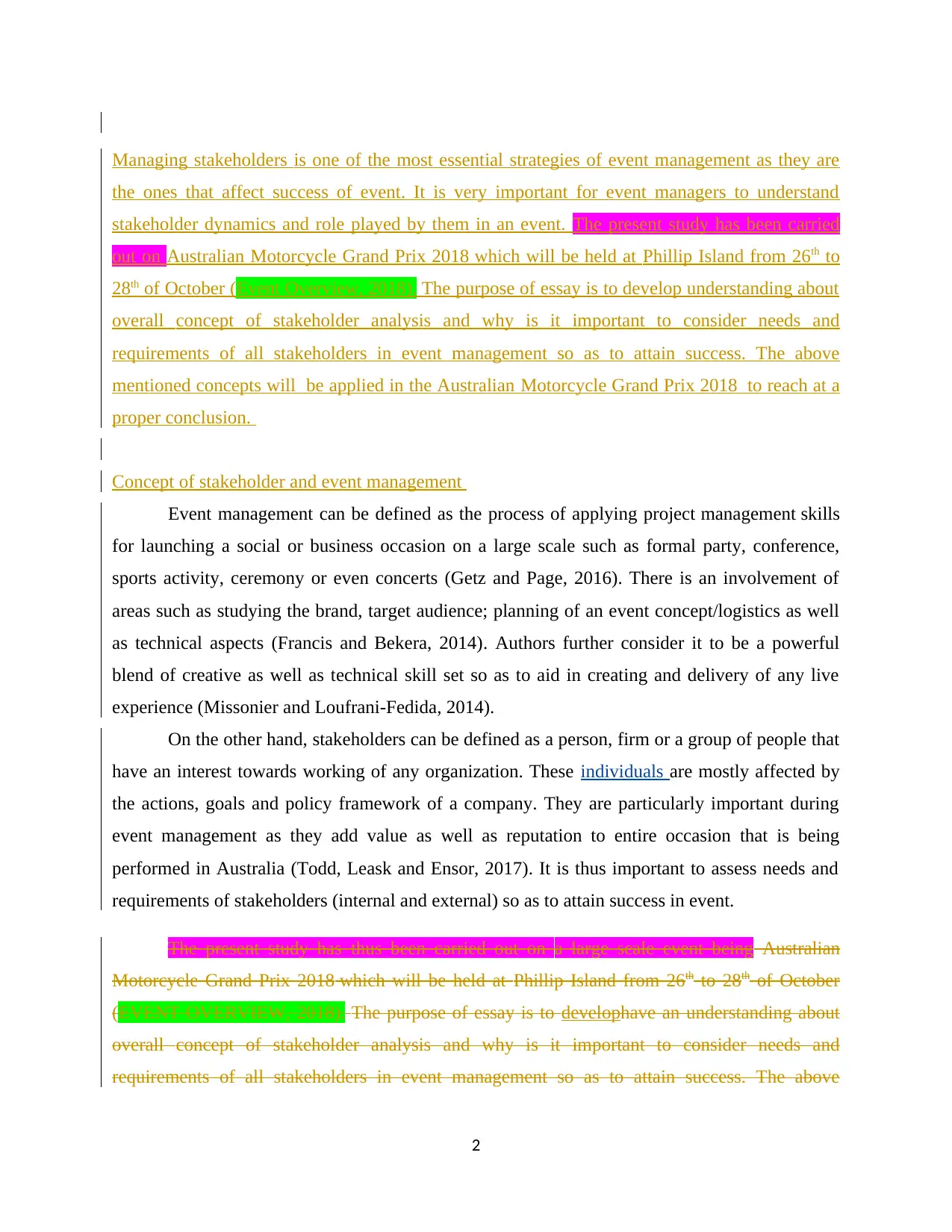
Managing stakeholders is one of the most essential strategies of event management as they are
the ones that affect success of event. It is very important for event managers to understand
stakeholder dynamics and role played by them in an event. The present study has been carried
out on Australian Motorcycle Grand Prix 2018 which will be held at Phillip Island from 26th to
28th of October (Event Overview, 2018). The purpose of essay is to develop understanding about
overall concept of stakeholder analysis and why is it important to consider needs and
requirements of all stakeholders in event management so as to attain success. The above
mentioned concepts will be applied in the Australian Motorcycle Grand Prix 2018 to reach at a
proper conclusion.
Concept of stakeholder and event management
Event management can be defined as the process of applying project management skills
for launching a social or business occasion on a large scale such as formal party, conference,
sports activity, ceremony or even concerts (Getz and Page, 2016). There is an involvement of
areas such as studying the brand, target audience; planning of an event concept/logistics as well
as technical aspects (Francis and Bekera, 2014). Authors further consider it to be a powerful
blend of creative as well as technical skill set so as to aid in creating and delivery of any live
experience (Missonier and Loufrani-Fedida, 2014).
On the other hand, stakeholders can be defined as a person, firm or a group of people that
have an interest towards working of any organization. These individuals are mostly affected by
the actions, goals and policy framework of a company. They are particularly important during
event management as they add value as well as reputation to entire occasion that is being
performed in Australia (Todd, Leask and Ensor, 2017). It is thus important to assess needs and
requirements of stakeholders (internal and external) so as to attain success in event.
The present study has thus been carried out on a large scale event being Australian
Motorcycle Grand Prix 2018 which will be held at Phillip Island from 26th to 28th of October
(EVENT OVERVIEW, 2018). The purpose of essay is to develophave an understanding about
overall concept of stakeholder analysis and why is it important to consider needs and
requirements of all stakeholders in event management so as to attain success. The above
2
the ones that affect success of event. It is very important for event managers to understand
stakeholder dynamics and role played by them in an event. The present study has been carried
out on Australian Motorcycle Grand Prix 2018 which will be held at Phillip Island from 26th to
28th of October (Event Overview, 2018). The purpose of essay is to develop understanding about
overall concept of stakeholder analysis and why is it important to consider needs and
requirements of all stakeholders in event management so as to attain success. The above
mentioned concepts will be applied in the Australian Motorcycle Grand Prix 2018 to reach at a
proper conclusion.
Concept of stakeholder and event management
Event management can be defined as the process of applying project management skills
for launching a social or business occasion on a large scale such as formal party, conference,
sports activity, ceremony or even concerts (Getz and Page, 2016). There is an involvement of
areas such as studying the brand, target audience; planning of an event concept/logistics as well
as technical aspects (Francis and Bekera, 2014). Authors further consider it to be a powerful
blend of creative as well as technical skill set so as to aid in creating and delivery of any live
experience (Missonier and Loufrani-Fedida, 2014).
On the other hand, stakeholders can be defined as a person, firm or a group of people that
have an interest towards working of any organization. These individuals are mostly affected by
the actions, goals and policy framework of a company. They are particularly important during
event management as they add value as well as reputation to entire occasion that is being
performed in Australia (Todd, Leask and Ensor, 2017). It is thus important to assess needs and
requirements of stakeholders (internal and external) so as to attain success in event.
The present study has thus been carried out on a large scale event being Australian
Motorcycle Grand Prix 2018 which will be held at Phillip Island from 26th to 28th of October
(EVENT OVERVIEW, 2018). The purpose of essay is to develophave an understanding about
overall concept of stakeholder analysis and why is it important to consider needs and
requirements of all stakeholders in event management so as to attain success. The above
2
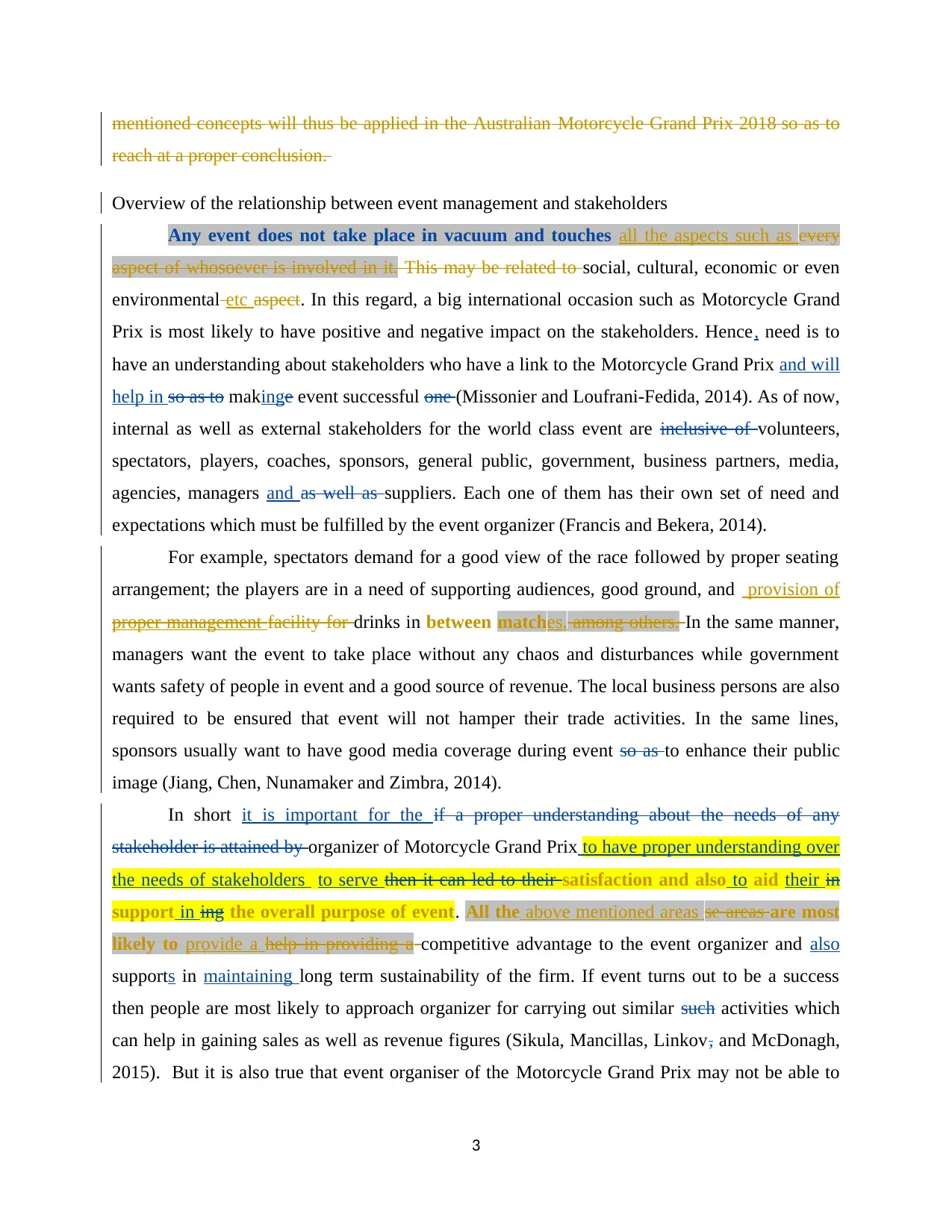
mentioned concepts will thus be applied in the Australian Motorcycle Grand Prix 2018 so as to
reach at a proper conclusion.
Overview of the relationship between event management and stakeholders
Any event does not take place in vacuum and touches all the aspects such as every
aspect of whosoever is involved in it. This may be related to social, cultural, economic or even
environmental etc aspect. In this regard, a big international occasion such as Motorcycle Grand
Prix is most likely to have positive and negative impact on the stakeholders. Hence, need is to
have an understanding about stakeholders who have a link to the Motorcycle Grand Prix and will
help in so as to makinge event successful one (Missonier and Loufrani-Fedida, 2014). As of now,
internal as well as external stakeholders for the world class event are inclusive of volunteers,
spectators, players, coaches, sponsors, general public, government, business partners, media,
agencies, managers and as well as suppliers. Each one of them has their own set of need and
expectations which must be fulfilled by the event organizer (Francis and Bekera, 2014).
For example, spectators demand for a good view of the race followed by proper seating
arrangement; the players are in a need of supporting audiences, good ground, and provision of
proper management facility for drinks in between matches. among others. In the same manner,
managers want the event to take place without any chaos and disturbances while government
wants safety of people in event and a good source of revenue. The local business persons are also
required to be ensured that event will not hamper their trade activities. In the same lines,
sponsors usually want to have good media coverage during event so as to enhance their public
image (Jiang, Chen, Nunamaker and Zimbra, 2014).
In short it is important for the if a proper understanding about the needs of any
stakeholder is attained by organizer of Motorcycle Grand Prix to have proper understanding over
the needs of stakeholders to serve then it can led to their satisfaction and also to aid their in
support in ing the overall purpose of event. All the above mentioned areas se areas are most
likely to provide a help in providing a competitive advantage to the event organizer and also
supports in maintaining long term sustainability of the firm. If event turns out to be a success
then people are most likely to approach organizer for carrying out similar such activities which
can help in gaining sales as well as revenue figures (Sikula, Mancillas, Linkov, and McDonagh,
2015). But it is also true that event organiser of the Motorcycle Grand Prix may not be able to
3
reach at a proper conclusion.
Overview of the relationship between event management and stakeholders
Any event does not take place in vacuum and touches all the aspects such as every
aspect of whosoever is involved in it. This may be related to social, cultural, economic or even
environmental etc aspect. In this regard, a big international occasion such as Motorcycle Grand
Prix is most likely to have positive and negative impact on the stakeholders. Hence, need is to
have an understanding about stakeholders who have a link to the Motorcycle Grand Prix and will
help in so as to makinge event successful one (Missonier and Loufrani-Fedida, 2014). As of now,
internal as well as external stakeholders for the world class event are inclusive of volunteers,
spectators, players, coaches, sponsors, general public, government, business partners, media,
agencies, managers and as well as suppliers. Each one of them has their own set of need and
expectations which must be fulfilled by the event organizer (Francis and Bekera, 2014).
For example, spectators demand for a good view of the race followed by proper seating
arrangement; the players are in a need of supporting audiences, good ground, and provision of
proper management facility for drinks in between matches. among others. In the same manner,
managers want the event to take place without any chaos and disturbances while government
wants safety of people in event and a good source of revenue. The local business persons are also
required to be ensured that event will not hamper their trade activities. In the same lines,
sponsors usually want to have good media coverage during event so as to enhance their public
image (Jiang, Chen, Nunamaker and Zimbra, 2014).
In short it is important for the if a proper understanding about the needs of any
stakeholder is attained by organizer of Motorcycle Grand Prix to have proper understanding over
the needs of stakeholders to serve then it can led to their satisfaction and also to aid their in
support in ing the overall purpose of event. All the above mentioned areas se areas are most
likely to provide a help in providing a competitive advantage to the event organizer and also
supports in maintaining long term sustainability of the firm. If event turns out to be a success
then people are most likely to approach organizer for carrying out similar such activities which
can help in gaining sales as well as revenue figures (Sikula, Mancillas, Linkov, and McDonagh,
2015). But it is also true that event organiser of the Motorcycle Grand Prix may not be able to
3
⊘ This is a preview!⊘
Do you want full access?
Subscribe today to unlock all pages.

Trusted by 1+ million students worldwide
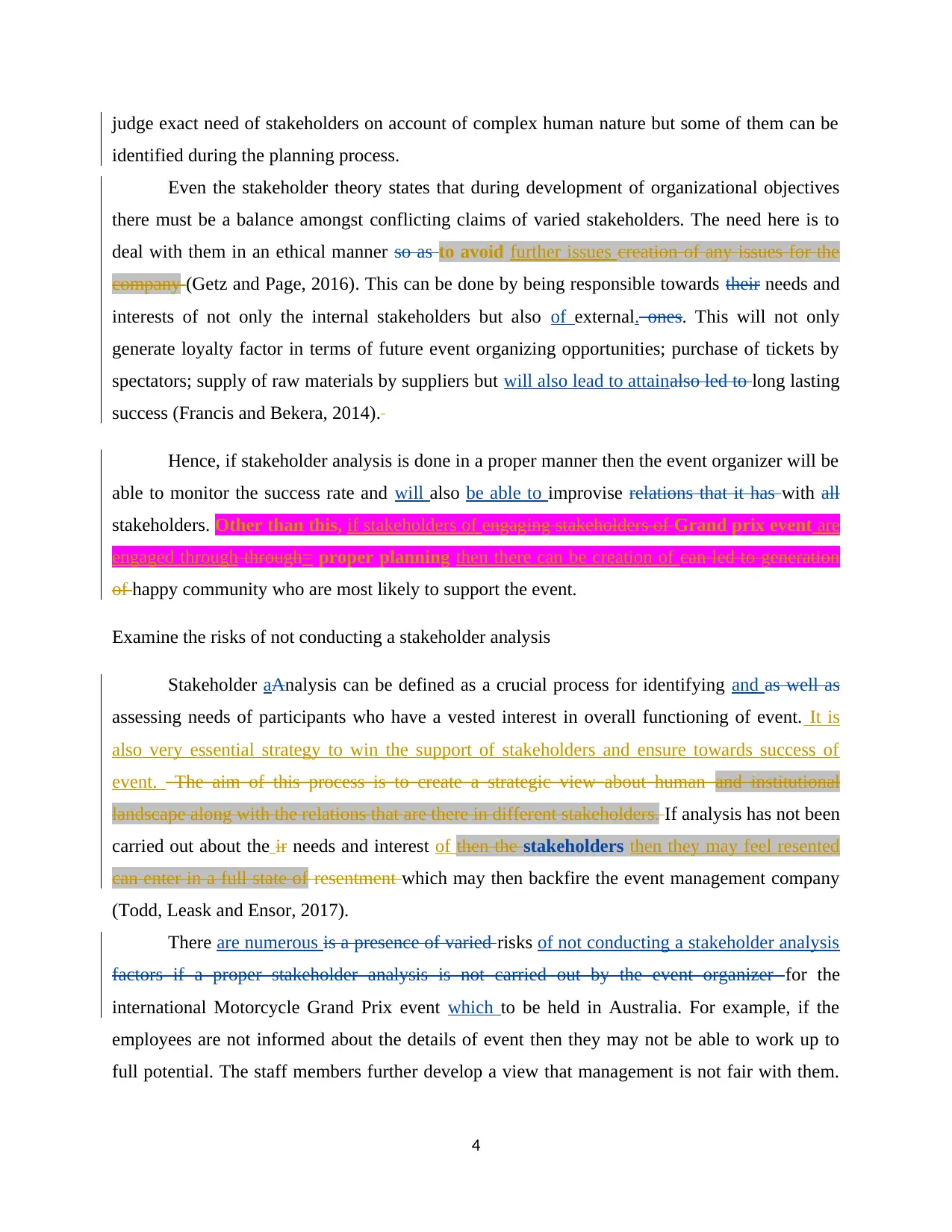
judge exact need of stakeholders on account of complex human nature but some of them can be
identified during the planning process.
Even the stakeholder theory states that during development of organizational objectives
there must be a balance amongst conflicting claims of varied stakeholders. The need here is to
deal with them in an ethical manner so as to avoid further issues creation of any issues for the
company (Getz and Page, 2016). This can be done by being responsible towards their needs and
interests of not only the internal stakeholders but also of external. ones. This will not only
generate loyalty factor in terms of future event organizing opportunities; purchase of tickets by
spectators; supply of raw materials by suppliers but will also lead to attainalso led to long lasting
success (Francis and Bekera, 2014).
Hence, if stakeholder analysis is done in a proper manner then the event organizer will be
able to monitor the success rate and will also be able to improvise relations that it has with all
stakeholders. Other than this, if stakeholders of engaging stakeholders of Grand prix event are
engaged through through= proper planning then there can be creation of can led to generation
of happy community who are most likely to support the event.
Examine the risks of not conducting a stakeholder analysis
Stakeholder aAnalysis can be defined as a crucial process for identifying and as well as
assessing needs of participants who have a vested interest in overall functioning of event. It is
also very essential strategy to win the support of stakeholders and ensure towards success of
event. The aim of this process is to create a strategic view about human and institutional
landscape along with the relations that are there in different stakeholders. If analysis has not been
carried out about the ir needs and interest of then the stakeholders then they may feel resented
can enter in a full state of resentment which may then backfire the event management company
(Todd, Leask and Ensor, 2017).
There are numerous is a presence of varied risks of not conducting a stakeholder analysis
factors if a proper stakeholder analysis is not carried out by the event organizer for the
international Motorcycle Grand Prix event which to be held in Australia. For example, if the
employees are not informed about the details of event then they may not be able to work up to
full potential. The staff members further develop a view that management is not fair with them.
4
identified during the planning process.
Even the stakeholder theory states that during development of organizational objectives
there must be a balance amongst conflicting claims of varied stakeholders. The need here is to
deal with them in an ethical manner so as to avoid further issues creation of any issues for the
company (Getz and Page, 2016). This can be done by being responsible towards their needs and
interests of not only the internal stakeholders but also of external. ones. This will not only
generate loyalty factor in terms of future event organizing opportunities; purchase of tickets by
spectators; supply of raw materials by suppliers but will also lead to attainalso led to long lasting
success (Francis and Bekera, 2014).
Hence, if stakeholder analysis is done in a proper manner then the event organizer will be
able to monitor the success rate and will also be able to improvise relations that it has with all
stakeholders. Other than this, if stakeholders of engaging stakeholders of Grand prix event are
engaged through through= proper planning then there can be creation of can led to generation
of happy community who are most likely to support the event.
Examine the risks of not conducting a stakeholder analysis
Stakeholder aAnalysis can be defined as a crucial process for identifying and as well as
assessing needs of participants who have a vested interest in overall functioning of event. It is
also very essential strategy to win the support of stakeholders and ensure towards success of
event. The aim of this process is to create a strategic view about human and institutional
landscape along with the relations that are there in different stakeholders. If analysis has not been
carried out about the ir needs and interest of then the stakeholders then they may feel resented
can enter in a full state of resentment which may then backfire the event management company
(Todd, Leask and Ensor, 2017).
There are numerous is a presence of varied risks of not conducting a stakeholder analysis
factors if a proper stakeholder analysis is not carried out by the event organizer for the
international Motorcycle Grand Prix event which to be held in Australia. For example, if the
employees are not informed about the details of event then they may not be able to work up to
full potential. The staff members further develop a view that management is not fair with them.
4
Paraphrase This Document
Need a fresh take? Get an instant paraphrase of this document with our AI Paraphraser
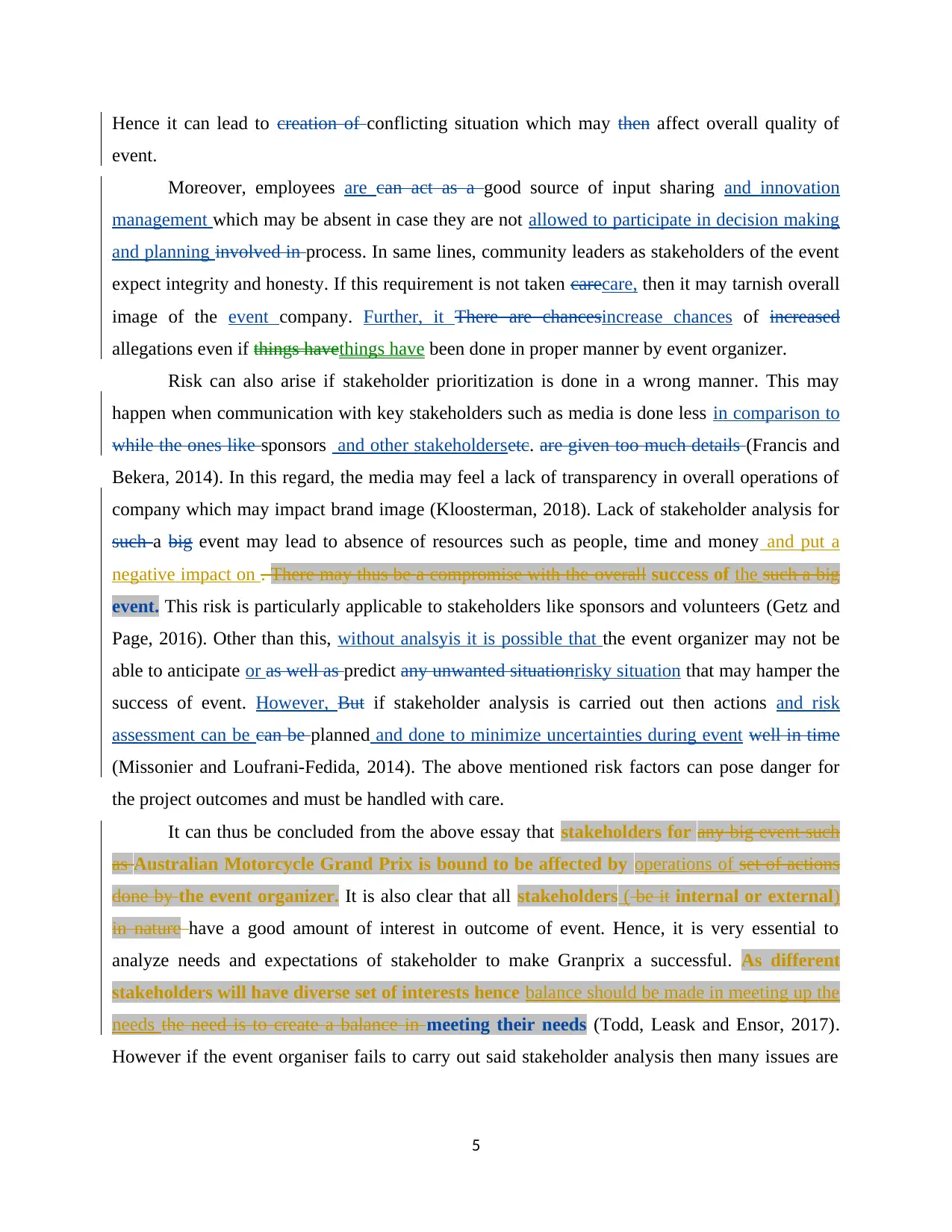
Hence it can lead to creation of conflicting situation which may then affect overall quality of
event.
Moreover, employees are can act as a good source of input sharing and innovation
management which may be absent in case they are not allowed to participate in decision making
and planning involved in process. In same lines, community leaders as stakeholders of the event
expect integrity and honesty. If this requirement is not taken carecare, then it may tarnish overall
image of the event company. Further, it There are chancesincrease chances of increased
allegations even if things havethings have been done in proper manner by event organizer.
Risk can also arise if stakeholder prioritization is done in a wrong manner. This may
happen when communication with key stakeholders such as media is done less in comparison to
while the ones like sponsors and other stakeholdersetc. are given too much details (Francis and
Bekera, 2014). In this regard, the media may feel a lack of transparency in overall operations of
company which may impact brand image (Kloosterman, 2018). Lack of stakeholder analysis for
such a big event may lead to absence of resources such as people, time and money and put a
negative impact on . There may thus be a compromise with the overall success of the such a big
event. This risk is particularly applicable to stakeholders like sponsors and volunteers (Getz and
Page, 2016). Other than this, without analsyis it is possible that the event organizer may not be
able to anticipate or as well as predict any unwanted situationrisky situation that may hamper the
success of event. However, But if stakeholder analysis is carried out then actions and risk
assessment can be can be planned and done to minimize uncertainties during event well in time
(Missonier and Loufrani-Fedida, 2014). The above mentioned risk factors can pose danger for
the project outcomes and must be handled with care.
It can thus be concluded from the above essay that stakeholders for any big event such
as Australian Motorcycle Grand Prix is bound to be affected by operations of set of actions
done by the event organizer. It is also clear that all stakeholders ( be it internal or external)
in nature have a good amount of interest in outcome of event. Hence, it is very essential to
analyze needs and expectations of stakeholder to make Granprix a successful. As different
stakeholders will have diverse set of interests hence balance should be made in meeting up the
needs the need is to create a balance in meeting their needs (Todd, Leask and Ensor, 2017).
However if the event organiser fails to carry out said stakeholder analysis then many issues are
5
event.
Moreover, employees are can act as a good source of input sharing and innovation
management which may be absent in case they are not allowed to participate in decision making
and planning involved in process. In same lines, community leaders as stakeholders of the event
expect integrity and honesty. If this requirement is not taken carecare, then it may tarnish overall
image of the event company. Further, it There are chancesincrease chances of increased
allegations even if things havethings have been done in proper manner by event organizer.
Risk can also arise if stakeholder prioritization is done in a wrong manner. This may
happen when communication with key stakeholders such as media is done less in comparison to
while the ones like sponsors and other stakeholdersetc. are given too much details (Francis and
Bekera, 2014). In this regard, the media may feel a lack of transparency in overall operations of
company which may impact brand image (Kloosterman, 2018). Lack of stakeholder analysis for
such a big event may lead to absence of resources such as people, time and money and put a
negative impact on . There may thus be a compromise with the overall success of the such a big
event. This risk is particularly applicable to stakeholders like sponsors and volunteers (Getz and
Page, 2016). Other than this, without analsyis it is possible that the event organizer may not be
able to anticipate or as well as predict any unwanted situationrisky situation that may hamper the
success of event. However, But if stakeholder analysis is carried out then actions and risk
assessment can be can be planned and done to minimize uncertainties during event well in time
(Missonier and Loufrani-Fedida, 2014). The above mentioned risk factors can pose danger for
the project outcomes and must be handled with care.
It can thus be concluded from the above essay that stakeholders for any big event such
as Australian Motorcycle Grand Prix is bound to be affected by operations of set of actions
done by the event organizer. It is also clear that all stakeholders ( be it internal or external)
in nature have a good amount of interest in outcome of event. Hence, it is very essential to
analyze needs and expectations of stakeholder to make Granprix a successful. As different
stakeholders will have diverse set of interests hence balance should be made in meeting up the
needs the need is to create a balance in meeting their needs (Todd, Leask and Ensor, 2017).
However if the event organiser fails to carry out said stakeholder analysis then many issues are
5

likely to arrive before the company. These are in form of trust issues a decrease in trust factor;
lack of support; absence of resources such asin form of people, time as well as money.
6
lack of support; absence of resources such asin form of people, time as well as money.
6
⊘ This is a preview!⊘
Do you want full access?
Subscribe today to unlock all pages.

Trusted by 1+ million students worldwide
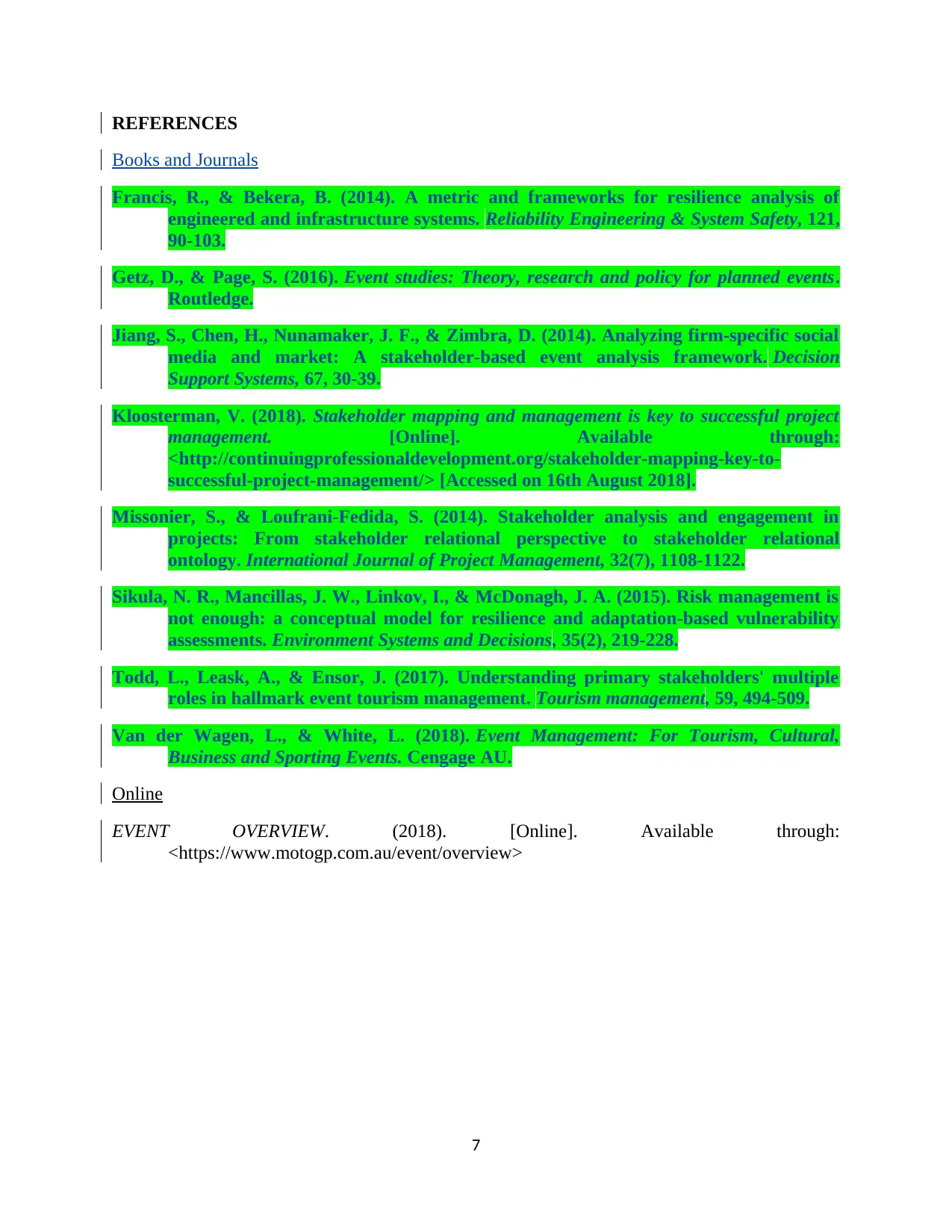
REFERENCES
Books and Journals
Francis, R., & Bekera, B. (2014). A metric and frameworks for resilience analysis of
engineered and infrastructure systems. Reliability Engineering & System Safety, 121,
90-103.
Getz, D., & Page, S. (2016). Event studies: Theory, research and policy for planned events.
Routledge.
Jiang, S., Chen, H., Nunamaker, J. F., & Zimbra, D. (2014). Analyzing firm-specific social
media and market: A stakeholder-based event analysis framework. Decision
Support Systems, 67, 30-39.
Kloosterman, V. (2018). Stakeholder mapping and management is key to successful project
management. [Online]. Available through:
<http://continuingprofessionaldevelopment.org/stakeholder-mapping-key-to-
successful-project-management/> [Accessed on 16th August 2018].
Missonier, S., & Loufrani-Fedida, S. (2014). Stakeholder analysis and engagement in
projects: From stakeholder relational perspective to stakeholder relational
ontology. International Journal of Project Management, 32(7), 1108-1122.
Sikula, N. R., Mancillas, J. W., Linkov, I., & McDonagh, J. A. (2015). Risk management is
not enough: a conceptual model for resilience and adaptation-based vulnerability
assessments. Environment Systems and Decisions, 35(2), 219-228.
Todd, L., Leask, A., & Ensor, J. (2017). Understanding primary stakeholders' multiple
roles in hallmark event tourism management. Tourism management, 59, 494-509.
Van der Wagen, L., & White, L. (2018). Event Management: For Tourism, Cultural,
Business and Sporting Events. Cengage AU.
Online
EVENT OVERVIEW. (2018). [Online]. Available through:
<https://www.motogp.com.au/event/overview>
7
Books and Journals
Francis, R., & Bekera, B. (2014). A metric and frameworks for resilience analysis of
engineered and infrastructure systems. Reliability Engineering & System Safety, 121,
90-103.
Getz, D., & Page, S. (2016). Event studies: Theory, research and policy for planned events.
Routledge.
Jiang, S., Chen, H., Nunamaker, J. F., & Zimbra, D. (2014). Analyzing firm-specific social
media and market: A stakeholder-based event analysis framework. Decision
Support Systems, 67, 30-39.
Kloosterman, V. (2018). Stakeholder mapping and management is key to successful project
management. [Online]. Available through:
<http://continuingprofessionaldevelopment.org/stakeholder-mapping-key-to-
successful-project-management/> [Accessed on 16th August 2018].
Missonier, S., & Loufrani-Fedida, S. (2014). Stakeholder analysis and engagement in
projects: From stakeholder relational perspective to stakeholder relational
ontology. International Journal of Project Management, 32(7), 1108-1122.
Sikula, N. R., Mancillas, J. W., Linkov, I., & McDonagh, J. A. (2015). Risk management is
not enough: a conceptual model for resilience and adaptation-based vulnerability
assessments. Environment Systems and Decisions, 35(2), 219-228.
Todd, L., Leask, A., & Ensor, J. (2017). Understanding primary stakeholders' multiple
roles in hallmark event tourism management. Tourism management, 59, 494-509.
Van der Wagen, L., & White, L. (2018). Event Management: For Tourism, Cultural,
Business and Sporting Events. Cengage AU.
Online
EVENT OVERVIEW. (2018). [Online]. Available through:
<https://www.motogp.com.au/event/overview>
7
1 out of 7
Your All-in-One AI-Powered Toolkit for Academic Success.
+13062052269
info@desklib.com
Available 24*7 on WhatsApp / Email
![[object Object]](/_next/static/media/star-bottom.7253800d.svg)
Unlock your academic potential
Copyright © 2020–2026 A2Z Services. All Rights Reserved. Developed and managed by ZUCOL.